|
Home
About
Us
Bookstore
Links
Blog
Archive
Books
Cinema
Fine Arts
Horror
Media & Copyright
Music
Public Square
Television
Theater
War & Peace
Affilates
Horror Film Aesthetics
Horror Film Festivals
Horror Film Reviews
Tabloid Witch Awards
Weekly Universe
Archives




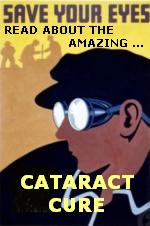

|
CANNON FODDER: ARABS, ISRAELIS UNITE AGAINST ZOMBIES
by Thomas M. Sipos, managing editor [August 22, 2013]
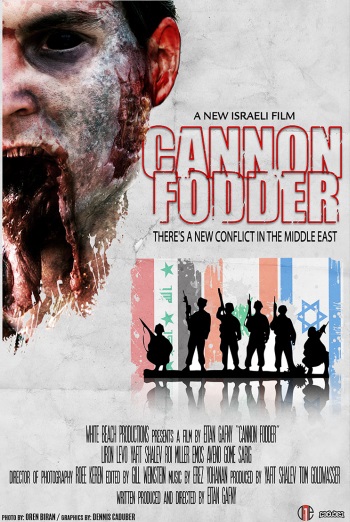 [HollywoodInvestigator.com] The zombie film formula is stubbornly durable, adaptable to any environment. The latest proof of that is Cannon Fodder. Although the film was made in Israel, and thus draws some unique story elements from that locale, its similarities to previous zombie films -- particularly the 1980s Italian classics -- outweigh the differences. [HollywoodInvestigator.com] The zombie film formula is stubbornly durable, adaptable to any environment. The latest proof of that is Cannon Fodder. Although the film was made in Israel, and thus draws some unique story elements from that locale, its similarities to previous zombie films -- particularly the 1980s Italian classics -- outweigh the differences.
Cannon Fodder's tone evokes the apocalyptic nihilism of Fulci's Zombi. Storywise, it more closely resembles Hell of the Living Dead. In both Cannon Fodder and Hell an elite military team is lied to by superiors, sent on a phony mission that promises to be a cake walk, only to discover an unexpected zombie outbreak.
"It's funny you mention those films," says Cannon Fodder writer/director Eitan Gafny. "I like them a lot, but never really managed to 'love' them or find them inspirational. I prefer to think that Cannon Fodder takes its influence from Romero's Night of the Living Dead and Dawn of the Dead in terms of story, tone, and character-building -- combining it with films like Predator in terms of feel, tone, character types, and style. Having said that, I think Zombi is a great, wicked film. I always try to push the boundaries, trying new things, like Fulci did in that crazy shark scene."
Zombies are often interpreted as metaphors for some greater phenomenon -- consumerism in Dawn of the Dead or the Vietnam War in Night of the Living Dead. In Cannon Fodder, an IDF team is sent into a Lebanese border village to capture a terrorist/double agent, but instead finds the place full of zombies. And because these zombies run rather than shamble, they will all that sooner overrun the entire Middle East. Thus, Cannon Fodder's zombies may be said to personify the dehumanization wrought by generations of war, terrorism, and failed political policies.
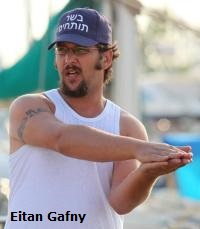 "Of course I wanted Cannon Fodder's zombies to mean something," says Gafny. "It's the first zombie film made in Israel. The film's whole concept is introducing an elite IDF unit with a new enemy that is a direct result of the Middle Eastern conflict. [But] I didn't want the zombies to be a metaphor to any side of the conflict. That would have made the film less interesting and more flat. "Of course I wanted Cannon Fodder's zombies to mean something," says Gafny. "It's the first zombie film made in Israel. The film's whole concept is introducing an elite IDF unit with a new enemy that is a direct result of the Middle Eastern conflict. [But] I didn't want the zombies to be a metaphor to any side of the conflict. That would have made the film less interesting and more flat.
"Cannon Fodder 's zombies represent something bigger than an ideology. They represent hope. It sounds weird -- zombies and hope?! -- but that's what I was going for. The story is not about people fighting zombies. It's about people from different sides of the conflict having to work together and put aside their political differences, to insure a better tomorrow. Other than that, I'll leave interpretation to the viewers."
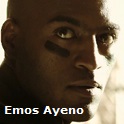 American media generally portrays Israel in romanticized, homogenous terms, but the IDF unit in Cannon Fodder is more interesting and diverse. Its soldiers include the Orthodox Avner (Gome Sarig), the Ethiopian atheist Moti (Emos Ayeno), and Daniel (Roi Miller), a gay Russian who tosses racial slurs. They are led by Doron (Liron Levo), whose conscience-laden cynicism evokes the typical noir anti-hero. American media generally portrays Israel in romanticized, homogenous terms, but the IDF unit in Cannon Fodder is more interesting and diverse. Its soldiers include the Orthodox Avner (Gome Sarig), the Ethiopian atheist Moti (Emos Ayeno), and Daniel (Roi Miller), a gay Russian who tosses racial slurs. They are led by Doron (Liron Levo), whose conscience-laden cynicism evokes the typical noir anti-hero.
"I wanted the unit to represent a microcosm of Israeli society," Gafny says, "but in a way that would allow people all over the world to relate to them. That's why I went for the Racist, the Naive, and the Skeptic. Having done that, I had to connect these archetypes to modern day Israel. That's why I went for sectors in society that can represent different aspects and carry on the stereotypes -- to break them later in the film.
"These characters do represent Israeli society, but parts of it, parts that are in an inner conflict with the majority of Israel's society. Knowing that a black man having to tolerate racial slurs from a racist, pumped-up white guy is something universal. And to break the stereotype of the racist white man, I gave the character reasons to hate himself [his gayness], and that makes him an interesting man to watch."
Without giving too much away, the racist, bullying Daniel reveals his nobler side when hordes of zombies nearly overtake his comrades, thus "breaking the stereotype" of the racist, white man.

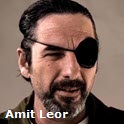 Less noble is Gideon (Amit Leor), a general who dispatches the IDF team on its phony mission. His eye patch invites comparisons to true-life Israeli general Moshe Dayan -- especially since that's what Daniel disparagingly calls Gideon. Less noble is Gideon (Amit Leor), a general who dispatches the IDF team on its phony mission. His eye patch invites comparisons to true-life Israeli general Moshe Dayan -- especially since that's what Daniel disparagingly calls Gideon.
"Dayan is one of Israel's heroes, one the 'poster children' for the almighty Israel of the 1970s," says Gafny. "Today we know he was a womanizer, an antiques thief, and a docuhebag in general. I wanted Gideon to echo Dayan, and not only to the Israeli crowd. This is something that I borrowed from Romero's Land of the Dead, where Dennis Hopper played Donald Rumsfeld to achieve the political statement."
It's nice when a film doesn't try to hide its location, because then it can exploit its visually distinctive landmarks (unlike horror films set in America, but shot in Bulgaria or Romania or Poland). One of Cannon Fodder's selling points is that it is the first zombie feature shot in Israel, and Gafny takes advantage of that by showing horror fans landscapes they have not seen in previous zombie fare. When the IDF team slips past an unguarded chain-link fence into Lebanon, I wondered -- is that what the border there really looks like?
"That scene was not shot near the Lebanese border," said Gafny, "although most of the movie was shot in northern Israel, close to the border with Lebanon, to achieve maximum authenticity. I served three years in the IDF as a combat fighter -- about a year and half at the Lebanese border. The movie is not 100% accurate, but pretty close. That's not to say Israel's army is not doing their job. Ask soldiers from any army in the world, and they can all tell you crazy stories about borders, fences, and what really goes on in real life."

(Although Cannon Fodder is likely the first zombie feature film out of the entire Middle East, it's not the first film from that region. That distinction might belong to Isa Swain's Hassad Al Möta (aka Envy of the Dead), a ten minute zombie short from the United Arab Emirates, completed in 2011 -- though there are probably other zombie shorts completed before that.)
Cannon Fodder's end credits role has a televised debate between a leftist activist and a rabbi, just before the TV studio is overrun by zombies. "The host is Gadi Sukenik," said Gafny, "one of Israel's top anchormen. That scene tells people what we really think, in case someone misinterpreted the film. The activist is yelling slogans from Israeli protest rallies from a while back. The rabbi is quoting a famous zombie film. They basically argue about nothing, while overlooking the real problem -- just like our politicians."
Cannon Fodder was shot on a Sony F 3 camera, using an exterior recorder for "better compression than the camera" can give, and Cooke Panchro lenses. It was edited on Avid, with CGI effects done on Adobe After Effects, Flame, and some 3D software.
"The soundtrack was composed and produced by Erez Yohanan from Amaseffer. We recorded nine songs (seven original songs, two cover songs), with about 30 artists from metal and rock bands like Orphaned Land, Betzefer, Useless ID, Prey for Nothing, System Divide, The Fading, and others. The soundtrack has a special guest appearance by Guns N' Roses's Ron 'Bumblefoot' Thal, and Zaher Zorgati from the Tunisian metal band Myrath."
Like many filmmakers, Gafny dislikes discussing money. "But I can tell you the budget is very low, about a quarter of a typical Israeli film -- less than 2% of World War Z's budget." It took nearly a year to raise the budget, from both private investors and the Israeli Film Fund, "a government fund that finances every other Israeli movie. They granted us a modest amount, referred to as 'the Guerrilla Film Budget'."
Gafny also had some aid from film school. "Tom Goldwasser (producer and assistant cameraman) and myself went to the head of the film department at Tel Aviv University, where we both studied, and told them that we wanted it to be our thesis film. So, technically, Cannon Fodder is one of the cheapest Israeli films ever made, but also one of the most expensive student films ever made.
Right now Cannon Fodder is doing the festival circuit, racking up four awards so far. "Regarding distribution, we're weighing our steps carefully, looking for the most suitable deal. We believe very soon we'll be able to tell good news, but nothing official yet."

|
